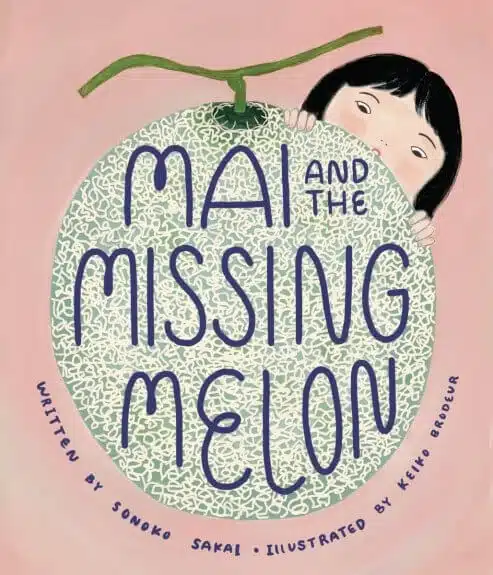
Mai and the Missing Melon
(Bala Kids)
- Fiction
- Set in Japan
Key words: grandparents, food, travel, kindness
This charming story invites the reader on a journey through rural 1960s Japan following a little girl named Mai on the Enoden train, past the oceanside populated with fishers, and to the classic shrine-like home of her grandmother, or obāchama.
Loosely based on an event in Sonoko’s childhood, Mai wishes to share the gift of a sweet muskmelon with her grandmother but loses it on the train along the way. Obāchama shares the Japanese folktale of The Stone Buddhas as an example of the power of good intentions to cheer Mai up.
After the story, Mai hears from the train station master that the melon has been found, and she and her obāchama are able to enjoy the sweet muskmelon together.
This sweet story explores the cherished relationship between a young girl and her grandmother–two great friends despite the age gap–while the expressive art takes the reader through the Japanese countryside, past the sea, bamboo forests, and temples, drawn from the author’s own childhood memories.
Setting: This book is set in Kamakura, Japan, in the 1960s. It takes place at the start of summer vacation, which runs from late July through August.
- Kamakura lies southwest of Tokyo. During 1185–1333, it was the seat of the shogunate government under the Minamoto and Hōjō families and grew as a center for Zen Buddhism. It is also home to many Shinto shrines. Kamakura is located along Sagami Bay, and Mount Fuji is often visible to the west. Sea, shrines, temples, and landscapes make the city a tourist destination for both Japanese and international visitors.
- While the publisher’s online note acknowledges the 1960s setting, the historical setting is not mentioned in the book. The identifiers of this time period are subtle; they include descriptions of cars, buses, shops, and houses in the town scene, and the clothing of people on the train, street, and beach. In the 1960s, it would have been more common to see adults and children in Japan wearing kimono, yukata (summer cotton kimono), samue (traditional workwear), and geta (wooden sandals) daily.
Muskmelon: This type of melon (Latin: Cucumis melo) has a raised, netted rind (touch the cover of a hardcopy version of the book) and orange or green flesh. In Japan, melons are sometimes a luxury item that might cost between $10 and $150 apiece, depending on the quality of the fruit. Melons are a gift chosen to show gratitude and respect, particularly during the midsummer ochūgen gift-giving season when fresh fruit cools the body in the heat of summer. In this story, the melon is wrapped and carried in a furoshiki, a traditional square wrapping cloth and a sustainable choice, preferable to shopping bags and gift wrapping.
Additional Japanese foods mentioned:
- ume pickles (referred to in Japanese as umeboshi) are made from the prunus mume fruit (similar to a plum), pickled by salting and fermentation. They are commonly paired with rice in Japanese bento boxes and with rice balls.
- tamago sando is the Japanese for an egg-salad sandwich.
- onigiri are balls or triangles of steamed rice. The book features them with pickled plum and nori (dried seaweed).
Roku Jizō: Jizō is a bodhisattva who protects people on journeys in both the physical and spiritual realms. In particular, Jizō is a protector of children before birth, during childhood, and after death. Groupings of six Jizō statues are common, one Jizō for each realm of existence in Buddhist doctrine. “Kasa Jizō” (Hats for Jizō) is a well-known folktale in which, during a snowstorm, an elderly hatmaker adorns a set of Jizō statues with his unsold woven hats. The statues repay his family with food for the new year. A set of six Jizō statues can be found at the Rokujizō intersection in the city of Kamakura.
Enoden train: Short for Enoshima Dentetsu, the Enoden train line dates back to just after the turn of the twentieth century. It runs between Kamakura and Fujisawa stations along the Shōnan coast of Sagami Bay, through narrow tunnels and even a section of a town street. It is not unusual for elementary-age children to ride alone on a train in Japan. While people eat bento boxes on long-distance trains, it is rare to see people eating on the short-distance commuter Enoden line, as portrayed in this book.
Lost and found: Japan is known for its efficient lost-and-found system. Young children are taught to return items they find to a teacher or other authority. Both local police and train stations have lost-and-found holding areas. The items most frequently turned in are umbrellas—thousands of umbrellas! The prevalent social custom to return lost property reflects a long-standing national law regarding lost property.
The true story behind this memoir: In the “Note from the Author” at the back of the book, Sakai writes that she did forget a melon on a train en route to see her Obāchama in Kamakura. Read Sakai’s article, “The Magical Melon Returns” (Los Angeles Times, August 29, 2001) for the full story. She also shares this story and other insights into the creation of this picture book in a National Consortium for Teaching about Asia webinar, “Freeman Book Award: Mai and the Missing Melon, with author Sonoko Sakai” (Five Colleges Center for East Asian Studies, November 6, 2024).
References:
Richarz, Allan. “Japan’s Lost-and-Found System Is Insanely Good.” Bloomberg. February 10, 2020. https://www.bloomberg.com/news/articles/2020-02-10/why-japan-s-lost-and-found-system-works-so-well
Sakai, Sonoko. “The Magical Melon Returns.” Los Angeles Times. August 29, 2001. https://www.latimes.com/archives/la-xpm-2001-aug-29-fo-39583-story.html
Sakai, Sonoko. “Freeman Book Award: Mai and the Missing Melon, with author Sonoko Sakai.” National Consortium for Teaching East Asia, Five Colleges Center for East Asian Studies. November 6, 2024. Register to view: https://attendee.gotowebinar.com/recording/1446240863727086852
Author: Catherine Higbee Ishida, Assistant Director for Japan and Korea Projects, Program for Teaching East Asia, University of Colorado Boulder
2025
NCTA webinar with author Sonoko Sakai.
